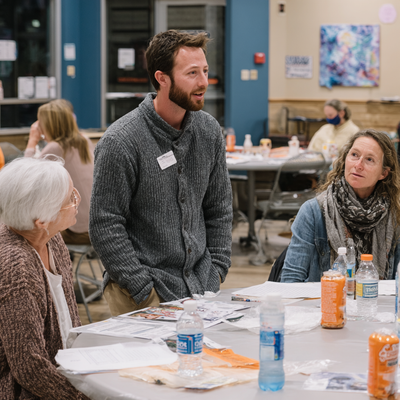Perfect! Now I have the correct content. For this post about motivating volunteers, I recommend:
Skip the keyword for this post.
This is another volunteer leadership/motivation post with no natural connection to curriculum, lessons, songs, VBS, or any of our keyword phrases. The content is entirely about volunteer management and motivation strategies, not teaching resources.
Here's the updated and grammar-corrected post:
Linda quit today. Just walked into my office and said she was done. No dramatic buildup or anything. Just sat down and dropped the bomb.
Been staring at my computer screen for an hour trying to figure out how I let this happen.
Linda's the one who makes everything work. Shows up stupid early to arrange craft supplies like she's preparing for surgery. Somehow gets elementary kids to actually listen during story time instead of climbing the walls. Cleaned up that epic paint disaster last month without saying a single word about how it ruined her white shirt.
"Why?" was all I could manage when she told me.
"I feel like furniture. Like I'm just there but nobody really sees me."
Furniture. Linda thinks she's furniture.
The woman who saves my butt every single week thinks she's invisible.
That's when I realized I've been doing this motivation thing completely wrong.
My Tony Robbins Phase
Had this period where I thought being a good leader meant being everyone's personal hype man. Endless positivity, constant encouragement, treating every volunteer interaction like a motivational seminar.
"You're incredible! These kids are so lucky! You're changing lives one Sunday at a time!"
Said this stuff with complete sincerity. Really meant every word. But people started getting this glazed look whenever I went into cheerleader mode.
Mike finally said, "Dude, I just need to know where you keep the construction paper. Save the pep talk."
Turns out nobody needs a life coach to find art supplies.
Food as Motivation Strategy
Read somewhere that food motivates volunteers. Started bringing bagels every Sunday. Then pizza for meetings. Then snacks for literally everything because apparently I thought people only volunteered for carbohydrates.
People ate the food. Of course they did. Free bagels are free bagels.
But they weren't more excited about volunteering. Just less hungry while doing the same stuff they always did.
My bank account started looking like I was feeding a small army every week.
Plus I created this expectation where people assumed every volunteer gathering included a meal. Like I was running some kind of ministry buffet.
The Public Humiliation Appreciation Strategy
Brilliant plan: recognize volunteers during church announcements. Call them up front, spotlight their service, get the whole congregation clapping for them.
Half my team looked like they wanted to disappear through the floor. Others just started skipping church on Sundays when they thought I might call their names.
Some people volunteer specifically because they hate being the center of attention. My appreciation strategy was basically torturing them for helping.
Karen actually said, "Call my name up there again and I'm switching to the Methodist church down the street."
Really nailed the motivation there.
Gift Card Awkwardness
Started giving Amazon cards for volunteer anniversaries. Twenty-five bucks for one year, fifty for three years, whatever seemed reasonable.
Felt weird though. Like I was paying people to serve God. Which kind of defeats the whole point and probably offended everyone involved.
Created math problems I wasn't ready for. How much for occasional helpers? What about people who miss weeks? Do you prorate based on attendance?
One volunteer returned her card. Said she didn't serve for prizes. Another asked if I thought people needed bribes to follow Jesus.
Fair questions I had no good answers for.
Training That Actually Helped
Finally stopped assuming I knew what people needed and just asked them.
"What's hard about your job?" "What do you wish you knew how to do?" "What makes Sunday mornings stressful?"
Got real answers instead of polite responses.
"Kids have meltdowns and I panic." "What do I say when they ask why their grandpa died?" "How do other people manage craft time without everything getting destroyed?"
Put together these informal sessions where volunteers who'd figured stuff out shared with people still struggling. Nothing fancy. Just honest conversations about what works.
Everyone showed up. Everyone participated. Everyone left feeling less alone.
Real help with real problems beats inspirational speeches every time.
Actually Listening
Stopped telling people how valuable they were and started asking how things were going.
"What's working for you?" "What's driving you crazy?" "What would make this easier?"
Found out about problems I had no idea existed.
Supply closet organized by someone who'd never worked with kids. Took twenty minutes every week just to find basic materials.
Room layout that looked nice but made managing children impossible.
Communication system that relied on people reading emails they never actually read.
Fixed these things immediately. Not because I'm a genius, but because people told me exactly what was wrong.
Flexibility That Changed Everything
When Linda said she was quitting, I asked what would make her stay.
"Sunday mornings are impossible with my kids' sports now. But I could do Wednesday nights."
Moved her to midweek programming. Same job, different time that actually worked for her life.
She's been more engaged than she'd been in months.
Sometimes people aren't unmotivated. They're just stuck in situations that stopped fitting their lives.
Crisis Team Building
A month ago our main teacher got food poisoning Saturday night. Called me Sunday morning barely able to talk.
Volunteers just handled it. Reorganized everything, covered for each other, made it work without any drama.
They felt amazing afterward. Like they'd accomplished something important together.
That crisis motivated them more than any volunteer appreciation event I'd ever planned.
What People Actually Want
Feeling capable at what they're doing. Having practical problems fixed when possible. Being trusted to make decisions without constant oversight. Flexibility when life gets complicated. Support from teammates, not just leadership. Seeing real impact from their work. Being heard when they have ideas or concerns.
Stuff That Actually Works
Ask what they need instead of guessing. Fix practical problems that make volunteering harder. Train people for real situations they'll face. Be flexible when circumstances change. Let volunteers teach each other. Trust them to do their jobs. Respond quickly to their concerns.
Resources That Get It
Orange focuses on practical support instead of just appreciation. Kids Sunday School Place addresses real volunteer challenges. Group's DIG IN builds genuine community. Grow Curriculum provides flexible systems. Gospel Project connects service to growth without pressure.
But honestly, the best resource is paying attention to your actual people and what they actually need.
What I'm Learning
Motivation isn't about pumping people up. It's about removing things that make them want to quit.
People don't need constant praise. They need practical support and respect.
Different people need different things. There's no magic motivation formula.
Sometimes the best thing you can do is get out of their way.
Most problems aren't attitude problems. They're system problems.
When someone feels invisible, it's not because they need more recognition. It's because you're not seeing them clearly.
Still figuring this out. But Linda's excited about ministry again, so something's working better than my old approach.
Watch YouTube
Listen to Podcast








